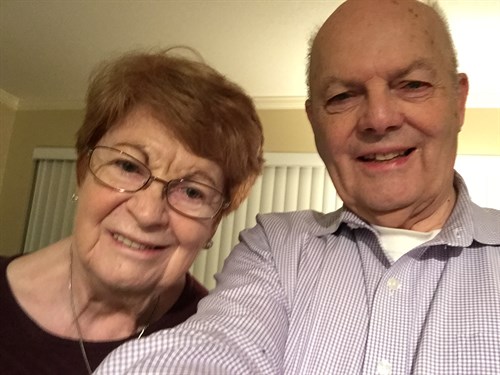John Murray is a caregiver and member of the Parkinson Society British Columbia (PSBC) community. With a background in business and pastoral ministry, he is now retired but continues to be involved in the pulpit ministry, public speaking and writing. The following is an excerpt from his newest book, Body Parts and the Invisible You. To learn more about John and his work, visit jmurray.ca.
My wife, Rita, has had Parkinson’s since 2008. Consequently I have become a caregiver. I am not an expert, far from it, I am still learning but let me share a few thoughts on being a caregiver in the hope that it might encourage you if you are in the same situation. Caregiving is not easy. It is not something we seek. We don’t ask for it. For the most part it comes upon us quite surreptitiously.
The simplest definition of caregiving is to provide physical and emotional support to those who are unable to care for themselves. But I believe it is more than that. I believe it is to create the very best environment and the best living conditions so that the person cared for enjoys life to the fullest possible extent, in spite of any incapacity.
The care we give develops and grows over time from the normal assistance and help, to ultimately full time twenty-four hour attention. One begins by doing simple things in the course of a regular day which help and provide support but then as the incapacities grow so does the need for help. The person cared for slowly becomes incapable of doing most routine daily activities. To me that has been painful. To see deterioration in the one you love is difficult to handle. One morning you wake up to realize that anything and everything that is to be done has to be done by you and that’s not just for one day but from here on in, every day! That thought is daunting and disturbing.
If one is caring for a spouse then it comes naturally out of the marriage relationship – it is all part of the commitment. Remember the wedding day and the words, “in sickness and in health.” Never did we think it would apply like this. This is where the rubber meets the road. This is where the vows and commitment made take shape and are fulfilled.
If you care for a parent then usually it is because you have accepted the responsibility, maybe because there is no one else to do the job. You recognized the need and have chosen to stand in the gap, strap on the load and commit to being the child again, but this time the roles have reversed and the responsibility for care has fallen on your shoulders.
It may be difficult to imagine but caregiving is not all negative. It brings its own rewards. For the most part those cared for appreciate the assistance they receive and recognize the effort, and maybe the sacrifice, expended on their behalf. Deep gratitude is never far below the surface even if it is not always verbalized.
What is required of us?
Every situation is different and has its own unique challenges. Those who have to deal with dementia and Alzheimer’s have their own set of hurdles. With Parkinson’s I think the slowness and inability of movement, which every patient has to endure, is the cause of much frustration in both the caregiver and those cared for. Everything happens in slow motion. Anything that can still be done by the person themselves is painfully slow.
I remember the day when my wife said “Hurry is no longer in my vocabulary!” She was right. There is little point in saying “Hurry up” because that adds frustration to the frustration. Allowing adequate time is the only solution. Leave extra preparation time. Adjust your thinking to accommodate delays. Something often goes wrong and at a time when you least need it to occur. Remember that frustration can easily lead to irritability which is no help to anyone. We as caregivers are especially vulnerable to this when we feel unwell ourselves and we know that we still have to do all the tasks which only we can do.
The great danger with slowness is that the caregiver wants to jump in and do things because they know they can do them much faster. That has to be resisted. We are there to help the cared for to be as independent as possible. It only makes them feel worse if small things which they can do are snatched away from them. As caregivers we have to be willing to allow things to take place at a snail’s pace if necessary. One has to remember that time is not of the essence in these circumstances but the emotional health of those cared for is. How much better for them to be praised for a small accomplishment than to be ready to go out of the house a couple of minutes earlier.
When does it all end?
Looking squarely at the future is difficult. There is no magic pill that makes all this go away. Hard as it is to say this but the task will get no easier than it is today. The demands will grow and the responsibilities will grow with them. Individual routine activities will become more difficult. However, the greater difficulty will be knowing when enough is enough and admitting the job is too much. Nobody wants that day to arrive.
I understand that most people go beyond their bearable level of total exhaustion. Pushed by the mindset of “I should be able to do this” or “Who else can do this but me” we are tempted to continue doing what we do and maybe even to the detriment of those for whom we care. The progression of becoming totally exhausted is so slow that it is virtually impossible to recognize. It is not until we find ourselves constantly tired and falling asleep every time we sit down that we might begin to admit that the job just might be getting too much. The justifiable fear is what happens beyond that. None of us want to go there, well I certainly don’t.
So my fellow Caregivers, keep working, keep helping, keep loving and be encouraged. Even if not expressed your efforts are deeply appreciated. You are important because you play an important role. In fact you are indispensable. You are the pillar that provides critical support. One day you will have a sense of comfort and satisfaction in the knowledge that you did the best you could. That is all that can be expected of you.

